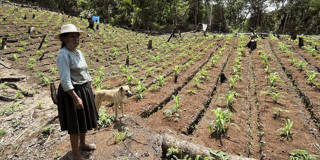After decades of wasted money and lost lives, it is time for governments to stop prosecuting a futile war on psychoactive substances, and instead embrace drug legalization and regulation. Only by taking back control of the drug market from criminals can policymakers begin to address the realities of substance use and abuse.
GENEVA – The market for illicit drugs represents the world’s largest criminal commodity business. With an estimated annual turnover of $426-652 billion, it is approximately one-third the size of the global oil market, and it is controlled by criminals who care little for others’ health, rights, and safety. Around the world, drug-related deaths have been surging, rising from 183,500 in 2011 to roughly 450,000 in 2015 – an increase of 145% in just four years.

GENEVA – The market for illicit drugs represents the world’s largest criminal commodity business. With an estimated annual turnover of $426-652 billion, it is approximately one-third the size of the global oil market, and it is controlled by criminals who care little for others’ health, rights, and safety. Around the world, drug-related deaths have been surging, rising from 183,500 in 2011 to roughly 450,000 in 2015 – an increase of 145% in just four years.